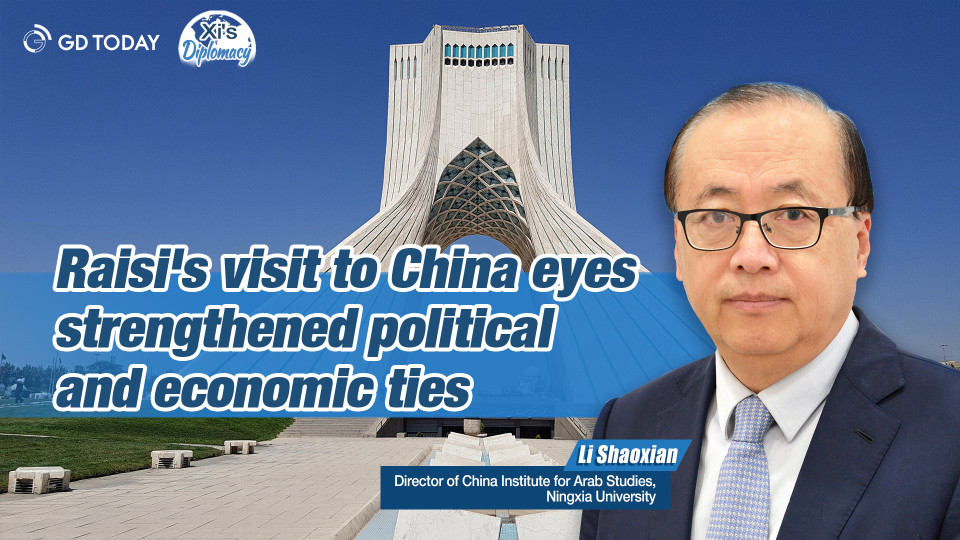Iranian President Ebrahim Raisi arrived in Beijing on February 14 for a three-day state visit, his first visit to China since taking office in August 2021.
“President Raisi’s visit aims to strengthen mutual trust and enhance political relations between China and Iran. In addition, he hopes to promote the implementation of long-term cooperative plans,” Li Shaoxian, director of the China Institute for Arab Studies at Ningxia University, told GDToday in an exclusive interview on February 15. Before the interview, Li attended a meeting with Raisi as one of the representatives of Chinese intellectuals.

China, Iran are major forces against hegemony
During Raisi’s visit, China and Iran noted that both sides are firmly opposed to unilateralism and hegemonism, and are ready to enhance cooperation.
Iran has suffered from US sanctions since 1979, which cover a wide range of fields including trade, finance, companies, science and technology, and military. According to the then Iranian President Hassan Rouhani, sanctions under the Trump administration caused at least 200 billion USD worth of economic damage to Iran. The Biden administration has resorted to a similar policy, and imposed a new round of sanctions on companies related to the production, sales and shipment of Iranian petrochemicals and petroleum on February 9.
Li noted the sanctions have impeded Iran’s economic cooperation with other countries and hindered its industrialization. “Many major projects between China and Iran have been thwarted due to the sanctions and US’ extraterritorial jurisdiction,” Li said.
In addition, US sanctions that deny Iranians access to essential medicines caused thousands of deaths in the country during the first two years of the COVID-19 pandemic, according to Kazem Gharibabadi, secretary of the Iranian High Council for Human Rights and deputy chief of the Iranian Judiciary for international affairs.
“Iran is one of the main victims of US’ hegemonic practices, and at the same time, an important force against hegemony and unilateralism in the world. I believe China-Iran cooperation is conducive to promoting real human rights progress and maintaining world peace,” Li noted.
Iran’s “looking east” policy, key to national development
In August 2021, Raisi articulated Iran’s diplomatic policy of “looking east” in his first press conference after assuming office. “Iran hopes to break the Western blockade and mitigate the influence of US sanctions through the policy, and China is its target partner,” Li said.
“When I visited Middle Eastern countries such as Iran, the locals often told me that they insist on political independence, but the US-led sanctions and suppression have endangered their national development. Therefore, they seek to ‘look east’ and hope to learn the experience of independent development from China and other countries,” he said.
Li analyzed that Iran practices its “looking east” policy through two approaches, saying, “The first one is to take part in the Belt and Road Initiative (BRI), which Iran regards as a major opportunity for national development. The geographic location of Iran is pivotal for the main route of the Belt and Road while the trade routes to Europe from China’s Xinjiang and Inner Mongolia converge on Iran.”
“Chinese companies have assisted Iran in building most of the metro lines and trains in Iran’s capital city, Teheran, through BRI projects, improving the local transportation efficiency and promoting tourism development,” Li added.
According to Li, Iran’s second approach in its “looking east” policy is to join the Shanghai Cooperation Organization (SCO), which is the first regional organization Iran has participated in since the 1979 Islamic Revolution.
In September 2021, the 21st summit of the SCO leaders held in Tajikistan’s capital Dushanbe declared the decision to start admitting Iran as a full member. Iran completed the legal procedures for joining the SCO in 2022. On February 7, 2023, Raisi issued an order for implementing the law on Iran’s membership of the SCO.
“In theory, Iran has already become an official SCO member. It is expected to attend the SCO summit in India in September 2023 as the ninth member of the organization,” Li said.
He believes Iran’s participation in the SCO will not only help Iran itself to tackle the economic and social plight caused by Western isolation, but would also boost the development of the SCO and international counter-terrorism cooperation.
The economies of China and Iran highly complementary
China and Iran stressed that they are ready to work with each other to implement the bilateral comprehensive cooperation plan, and deepen pragmatic cooperation, during Raisi’s visit. A 25-year agreement was signed between the two countries in 2021 to enhance comprehensive cooperation in a range of fields, including energy, infrastructure, production capacity, science and technology, and medical and health care.
“The economies of China and Iran are highly complementary. With the implementation of the deal, the two sides would tap the potential of economic and cultural cooperation,” Li said.
Li elaborated that Iran is a major oil exporter and holds the second-largest natural-gas reserve. “It is also one of the few countries in the Middle East with a relatively complete industrial system.”
In Li’s view, through cooperation, Iran can take advantage of its rich natural resources and promote bilateral trade, while China can make full use of its complete industrial chain and help Iran to push forward with industrial transformation and upgrading.
Bilateral trade between China and Iran reached $15.8 billion in 2022, up 7 percent year-on-year, and China has been Iran’s largest trading partner for 10 successive years, Shu Jueting, spokeswoman of the Ministry of Commerce, said on February 16 at a media conference.
“In addition to economic cooperation, it is also important for China and Iran, the two ancient civilizations, to strengthen cultural and people-to-people exchanges. Therefore, we can enhance mutual trust and achieve the full potential of cooperation,” Li noted.
Author | Lydia Liu
Editor | Wing, Steven, Jasmine, James
















